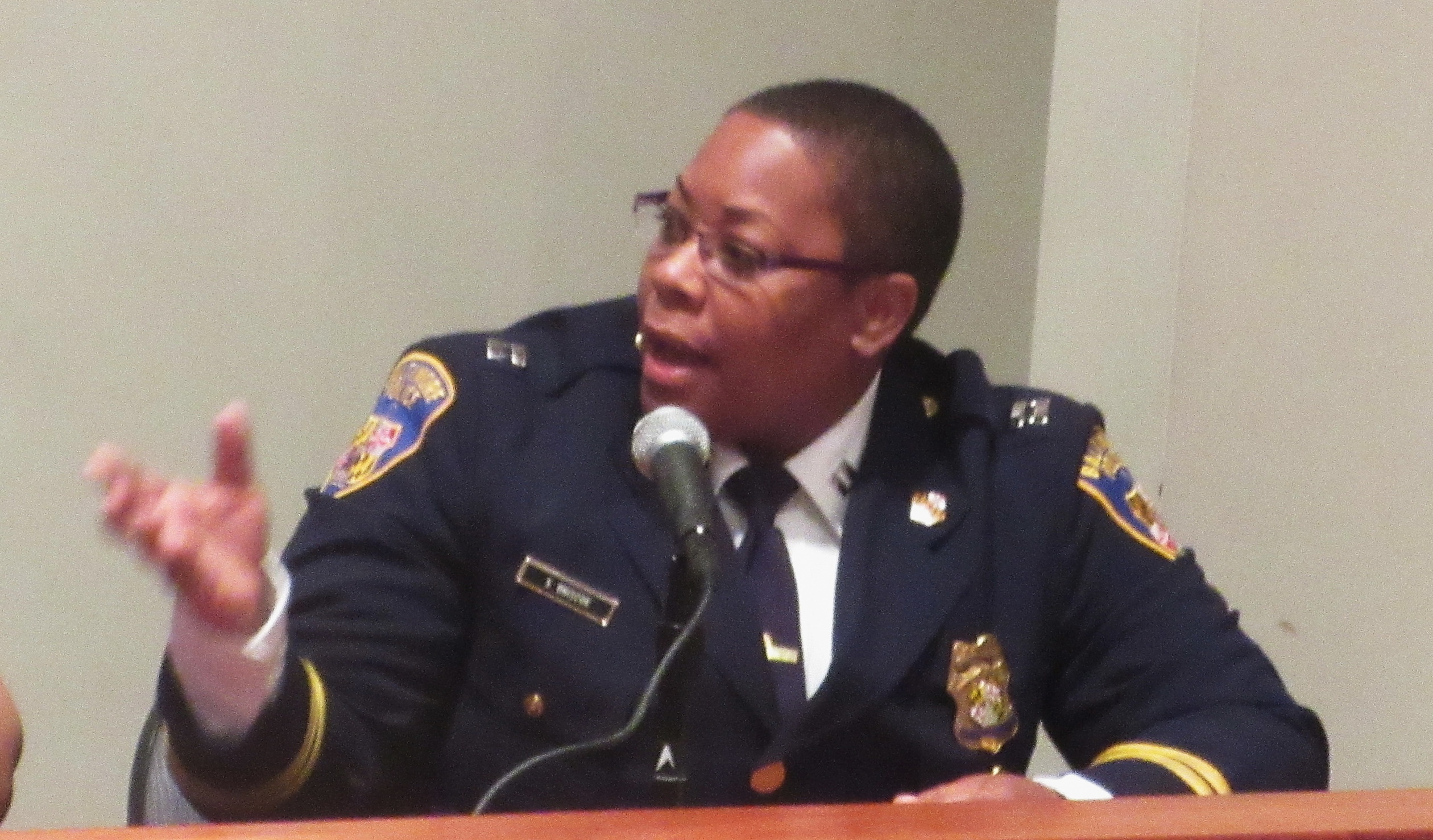By Len Lazarick
Baltimore Police Captain Sheree Briscoe is the new commander of the Western District, the epicenter of the convulsions that wracked Baltimore six weeks ago.
A cop for 21 years, she is not what you expect. Short and wide, she grew up in the city, and is the mother of four and the grandmother of three.
“We asked to go” to the Western district, Briscoe said, referring to herself and her deputy, R. Jackson. Both are African-American.
“This was an opportunity to do something different and to do something better,” she said.
Briscoe was the star of the panel on criminal justice reform at the University of Baltimore Wednesday, put on by the local NAACP and cosponsored by the Maryland Republican Party.
More attention for the city
The unrest over the death of Freddie Gray in police custody has led a lot of organizations to take another look at what’s wrong with Baltimore and what can be done about it. The Maryland Republican Party wanted to be part of that, cosponsoring a series of events in a city that votes overwhelmingly Democratic.
The GOP had brought in Rev. C.L. Bryant and Dr. Alveda King, niece of Dr. Martin Luther King, two national civil right activists who are sort of the conservative equivalent of Al Sharpton.
They were on the panel with Briscoe, community organizers Tim Wilson and Dayvon Love, and Del. Jill Carter, a criminal defense attorney who has been one of the strongest advocates for police reform on the House Judiciary Committee.
House leaders find Carter difficult to deal with because of her in-your-face advocacy for the mostly black men caught up in mass incarceration resulting from the decades-long war on drugs and zero-tolerance policing. They left her off a new legislative workgroup on these issues.
“Politics is the only relationship I’ve seen where people are taught to love their abusers,” Carter remarked.
Fundamental needs for respect, safety
But it was Briscoe, filling in for Police Commissioner Anthony Batts, who wowed the small crowd of about 50.
“We are people first,” said Briscoe, and both the citizens of Baltimore and the police who serve them have “fundamental needs to be respected, to be safe.”
She told the audience, “if you don’t see them [the officers under her] operating as they should, ring my phone.”
“Your job is to hold us accountable,” Briscoe said.
When she “raised her right hand” for her oath as a sworn officer law, Briscoe said she was swearing to uphold an “ideology to provide safety, to provide justice.”
Police are “the guardians and keepers of justice,” she said. It’s often a dangerous job, but “someone has to do it.”
One of the core problems in the city she serves is “lack of respect,” and not just for police.
“There is a lack of respect for teachers, parents, there is a lack of respect for authority period,” and there needs to be “a larger conversation about authority.”
Carter said, “I’m very thankful for Captain Briscoe and she is what the community needs.”
“But she is in the minority,” the delegate said. The majority of police “don’t come from the community.”
But Briscoe “has the right mindset and her heart is in the right place.”
Fear on both sides
“There is a fear of police in this city,” said Bryant.
“But police are also afraid of us,” said Tim Wilson of On Our Shoulders, an organization providing job-training for teens and young adults. He acknowledged that one time, “I was part of the problem…. I actually used to fight with Freddie Gray.”
He said any time the police come out to a murder scene, they’re sure to attract a crowd of not very friendly onlookers.
The panel was all over the place in its observations, but they pretty much agreed that there are structural and systemic problems in Baltimore that demand a larger conversation than policing, particularly on mass incarceration.
Republican Party Executive Director Joe Cluster said the events with the NAACP were an effort to show that the party is listening to city residents and open to helping them.
Republican Gov. Larry Hogan, who got 22% of Baltimore’s vote last year, had campaigned in the city and spent a week walking the streets of Baltimore during the state of emergency he declared April 27.
Hassan Giordano, chair of the NAACP’s criminal justice committee, said the Hogan administration has helped with resources in its Sandtown offices, especially in helping get the criminal records expunged for people who have committed petty crimes, as permitted by a new law Hogan signed.
Republican volunteers are also helping people with job skills such as interviews and resumes.
The question for the community, Giordano said, is how long the Republican Party will stay interested in the city and engaged.






Nice work!